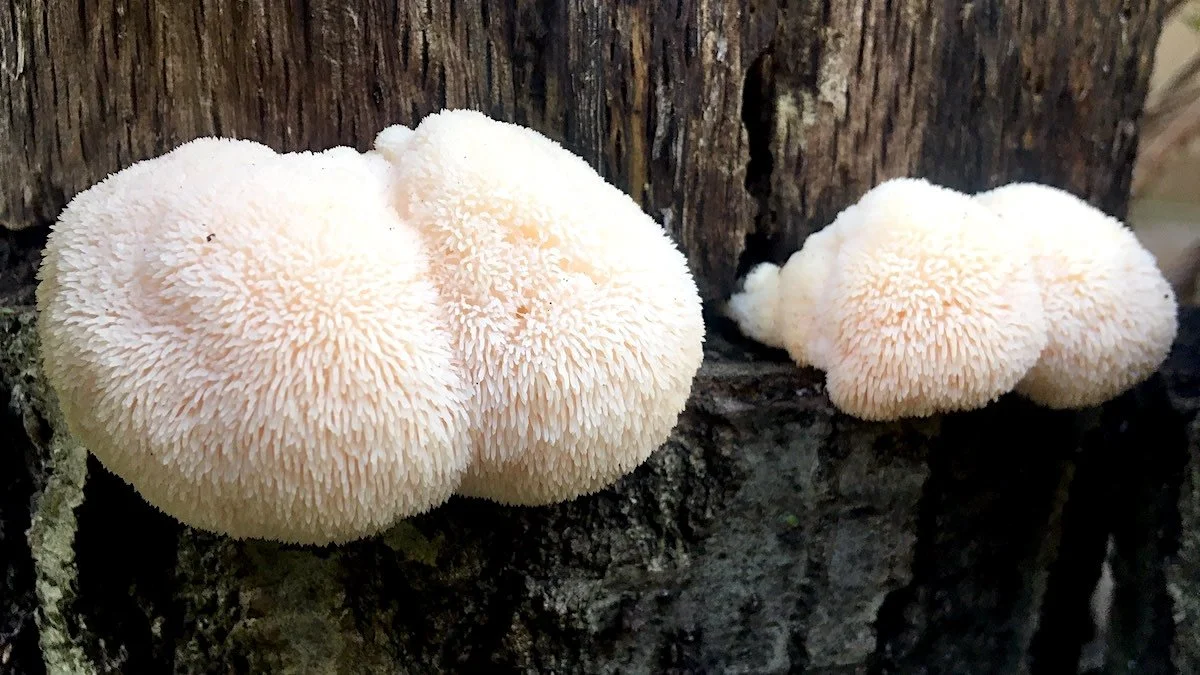Treat Your Brain with Lion’s Mane
Coniferous rainforests like this on in Steamboat Island, Washington are the ideal home for many edible and medicinal mushroom species.
Understanding the Doctrine of Signatures in Herbalism
In herbalism, the Doctrine of Signatures is the principle that a plant’s appearance can indicate the health benefits it provides to the human body. This concept suggests that plants and their parts—such as leaves, roots, fruits, or flowers—resemble specific body parts, and their medicinal properties are linked to these similarities.
Common Examples of the Doctrine of Signatures
Walnut: Known for supporting brain health, the walnut's shape resembles a small brain.
Horsetail (Equisetum arvense): Beneficial for bone health, its segmented stems resemble vertebrae.
Bleeding Heart (Lamprocapnos): Known for helping with emotional well-being, its delicate blooms look like fuchsia “bleeding hearts,” blooming around Valentine's Day.
These examples showcase how nature’s design often reflects the healing properties of plants, making them a valuable tool in herbal medicine.
A Personal Encounter with the Doctrine of Signatures
One of my most memorable experiences with the Doctrine of Signatures occurred during a camping trip with my herbalism school in the Ochoco National Forest. While we were hiking, we sought out specific medicinal plants, including Junipers, Hawthorn, and Reishi mushrooms, along with Turkey Tail fungi.
The Unexpected Discovery of Lion's Mane Mushroom
As we wrapped up our hike, I spotted what appeared to be a puffy white cloud stuck to the side of a fallen tree trunk. Upon closer inspection, I was thrilled to find it was a Lion's Mane mushroom, about the size of my head! This is a remarkable example of the Doctrine of Signatures, as Lion's Mane closely resembles a lion's mane and is known for its cognitive benefits.
We harvested it with care, appreciating the surprise and its potential for brain health.
The Medicinal Benefits of Lion's Mane
Lion's Mane is an incredible mushroom, particularly known for its brain-health benefits, including:
Improved cognition and concentration
Enhanced memory
Stimulation of brain cell growth
Its anti-inflammatory properties also make it useful for relieving stress and anxiety. This medicinal mushroom is a popular choice for those seeking to improve mental clarity and focus.
Reconnecting with Lion’s Mane: A Journey Back to Fungi
Years after my initial encounter with Lion’s Mane, I revisited the mushroom in a Pacific Northwest farmer's market. There, I met Arthur, a local mushroom cultivator who sold small-batch, homegrown medicinal mushrooms. His products were not only high-quality but also came with a meaningful cause: part of his sales went toward supporting veterans with PTSD through medicinal mushroom therapy.
Small-Batch Tinctures with Higher Alkaloid Content
Arthur’s tinctures stood out because:
They had a lower alcohol content compared to mass-produced tinctures.
They contained higher alkaloid concentrations, offering more effective medicinal benefits.
I found these tinctures to be especially helpful in providing both mental clarity (from Lion's Mane) and immune support (from Reishi), making them an integral part of my wellness routine.
The Power of Intent in Plant Medicine
What sets Arthur’s tinctures apart is not just the quality of the product, but also the intention behind it. Arthur crafts his mushrooms and tinctures with a sincere desire to benefit his community, and the proceeds help fund vital research in the field of psychedelic mushroom therapy for PTSD treatment.
This intention is something I’ve felt in my own practice, as I use these tinctures daily for clarity and mental focus while supporting a worthy cause.
How to Use Lion’s Mane and Reishi Tinctures
When incorporating medicinal tinctures into your routine, it's important to start slow and adjust as needed.
Recommended Dosage
Start with small doses to allow your body to adapt.
Gradually increase to 1mL (one full dropper) as your body becomes accustomed.
Tinctures can be taken directly under the tongue, swallowed, or added to beverages like coffee or tea.
Tips for Effective Use
Take breaks between daily use to prevent your body from building a tolerance.
Do not exceed 1-2mL of tincture per day.
Experiment with tincture timing and dosage to find what works best for your body and lifestyle.
Why Choose Small-Batch Mushroom Tinctures?
While store-bought tinctures are convenient, small-batch tinctures like Arthur’s offer distinct advantages:
Better taste: Less alcohol, more plant material.
More potent: Higher alkaloid content.
Greater support for local causes: Buying from small producers helps fund valuable research and community initiatives.
Arthur’s tinctures have been a constant companion in my journey toward better brain health, and I encourage others to explore the benefits of Lion’s Mane and Reishi for improved focus and mental clarity.
Final Thoughts on Medicinal Mushrooms and Wellness
The accessibility of medicinal mushrooms, like Lion’s Mane and Reishi, is on the rise, bringing new hope for those seeking natural remedies for brain health and emotional well-being. Whether you are looking to improve focus, reduce stress, or boost your immune system, these mushrooms offer numerous benefits.
Where to Find High-Quality Medicinal Mushrooms
Arthur’s Mushroom Farm: Visit his website to explore his selection of Lion’s Mane and Reishi tinctures, available year-round.
Small-Scale Producers: Look for local producers who craft tinctures with care, intention, and quality.
By supporting small, community-focused mushroom farms, you not only get high-quality products but also contribute to important causes like veteran mental health and holistic wellness.
Important Health Considerations
As always, when incorporating any new supplement or plant medicine, it is essential to consult a healthcare professional, especially if you are pregnant, nursing, or on prescribed medications. The advice provided here is for informational purposes only and should not be considered medical advice.




